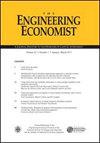Multi-objective optimization and cost-based output pricing of a standalone hybrid energy system integrated with desalination
IF 1
4区 经济学
Q4 BUSINESS
引用次数: 2
Abstract
Abstract The design and operation of hybrid energy systems, which are relevant to remote islands characterized by energy and water supply shortage, have been extensively investigated. However, determining the costs of different system outputs is still a challenging task. In this study, a multi-objective optimization was performed to obtain the optimal design parameters of a hybrid energy system integrated with desalination. As each consumer demand (inclusive of electrical, cooling, and water demands) is highly coupled to the other, output pricing was performed based on cost allocation using the cooperative game theory. The results show that cooling, electricity, and desalinized water can be co-generated efficiently and economically, and the electrical, cooling, and water demands should bear 13.40%, 53.90%, and 32.70%, respectively, of the annualized costs of the entire hybrid energy system. In the proposed model, the cooling demand has the strongest coupling characteristic, whereas the electrical demand has the weakest, because the electricity waste from the photovoltaic/thermal panels allows easier integration of the cooling demands with other demands, for the consumption of excess solar power.集成海水淡化的独立混合能源系统的多目标优化和基于成本的输出定价
摘要对与能源和供水短缺的偏远岛屿有关的混合能源系统的设计和运行进行了广泛的研究。然而,确定不同系统输出的成本仍然是一项具有挑战性的任务。在本研究中,进行了多目标优化,以获得与脱盐相结合的混合能源系统的最优设计参数。由于每个消费者需求(包括电力、冷却和水需求)彼此高度耦合,因此使用合作博弈论基于成本分配进行了产出定价。结果表明,冷却水、电力和脱盐水可以高效经济地联合发电,电力、冷却水和水的需求应分别承担整个混合能源系统年化成本的13.40%、53.90%和32.70%。在所提出的模型中,冷却需求具有最强的耦合特性,而电力需求最弱,因为光伏/热面板的电力浪费允许更容易地将冷却需求与其他需求相结合,以消耗多余的太阳能。
本文章由计算机程序翻译,如有差异,请以英文原文为准。
求助全文
约1分钟内获得全文
求助全文
来源期刊

Engineering Economist
ENGINEERING, INDUSTRIAL-OPERATIONS RESEARCH & MANAGEMENT SCIENCE
CiteScore
2.00
自引率
0.00%
发文量
14
审稿时长
>12 weeks
期刊介绍:
The Engineering Economist is a refereed journal published jointly by the Engineering Economy Division of the American Society of Engineering Education (ASEE) and the Institute of Industrial and Systems Engineers (IISE). The journal publishes articles, case studies, surveys, and book and software reviews that represent original research, current practice, and teaching involving problems of capital investment.
The journal seeks submissions in a number of areas, including, but not limited to: capital investment analysis, financial risk management, cost estimation and accounting, cost of capital, design economics, economic decision analysis, engineering economy education, research and development, and the analysis of public policy when it is relevant to the economic investment decisions made by engineers and technology managers.
 求助内容:
求助内容: 应助结果提醒方式:
应助结果提醒方式:


